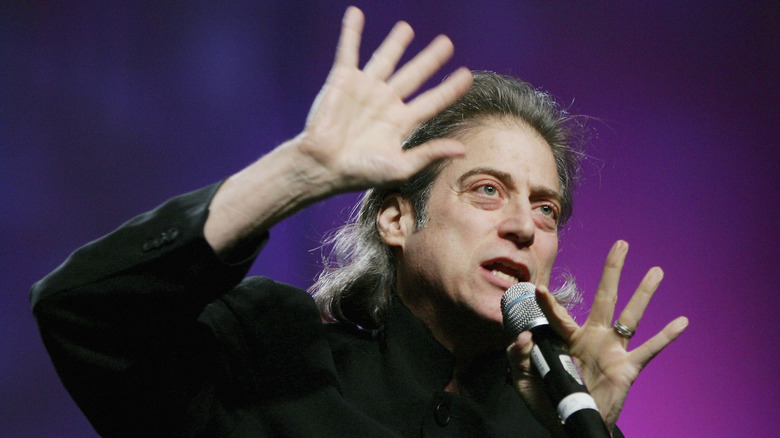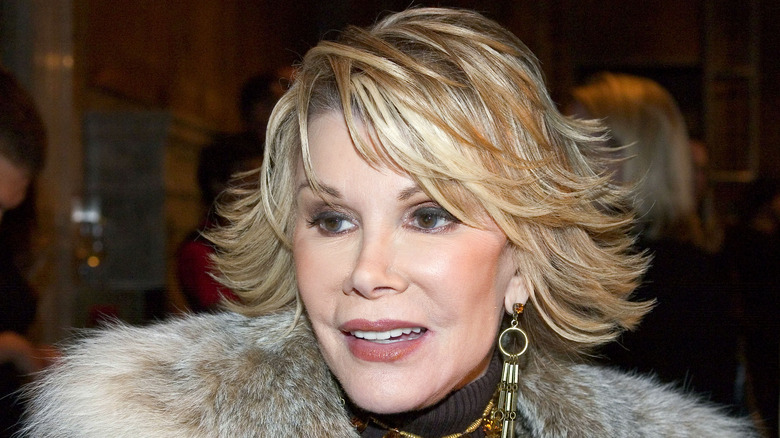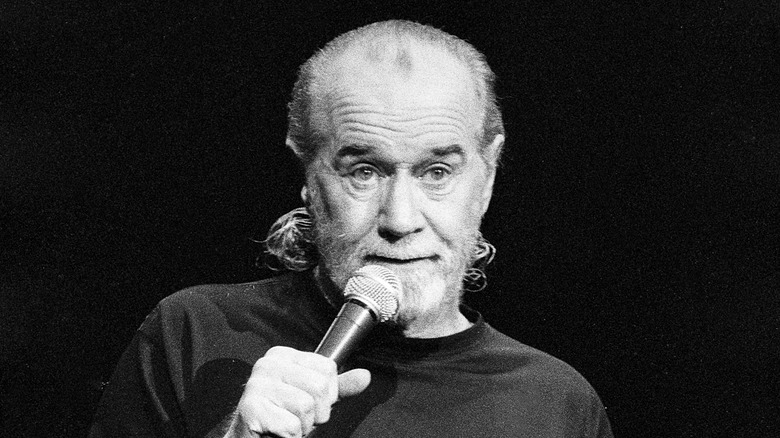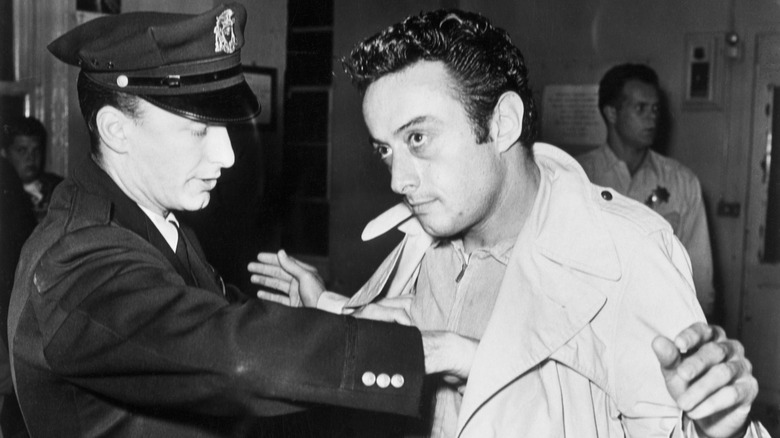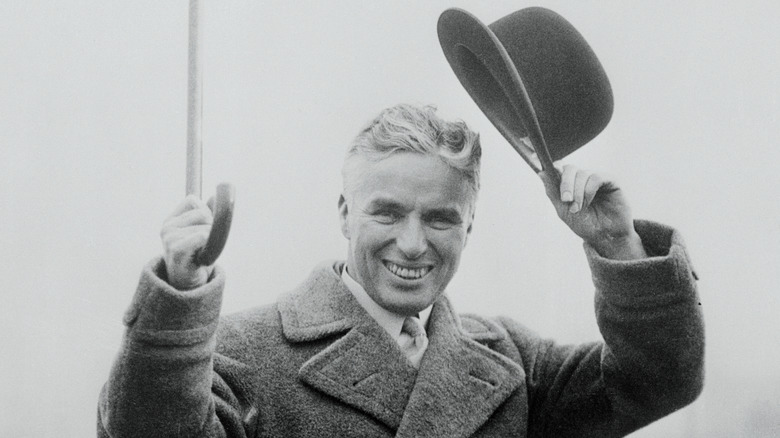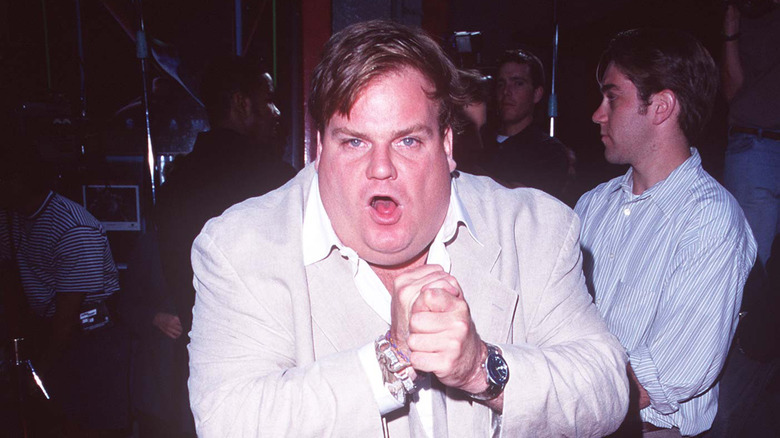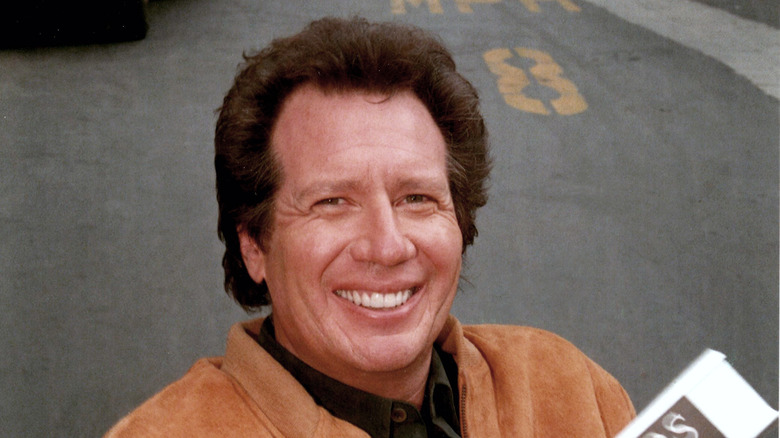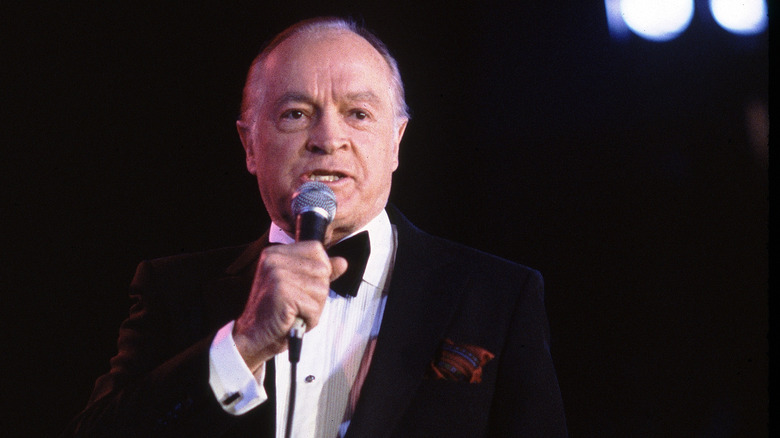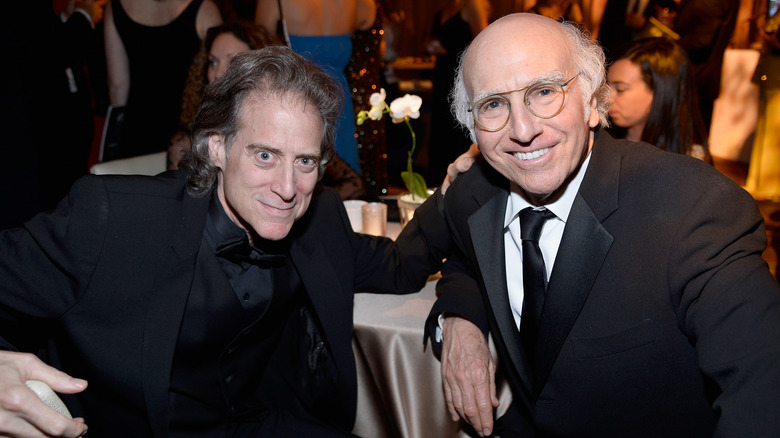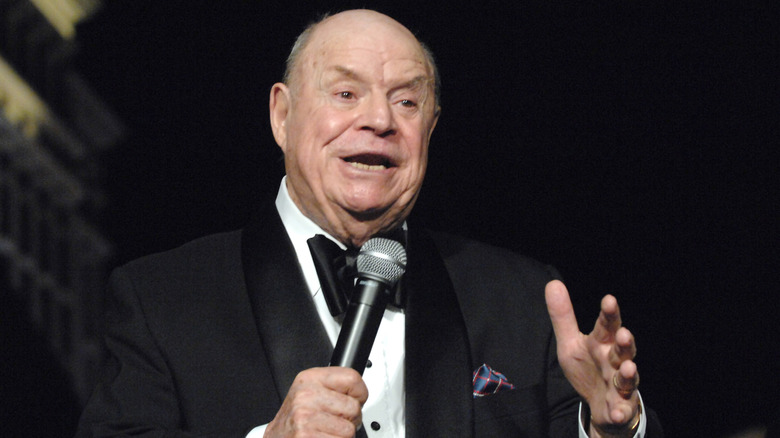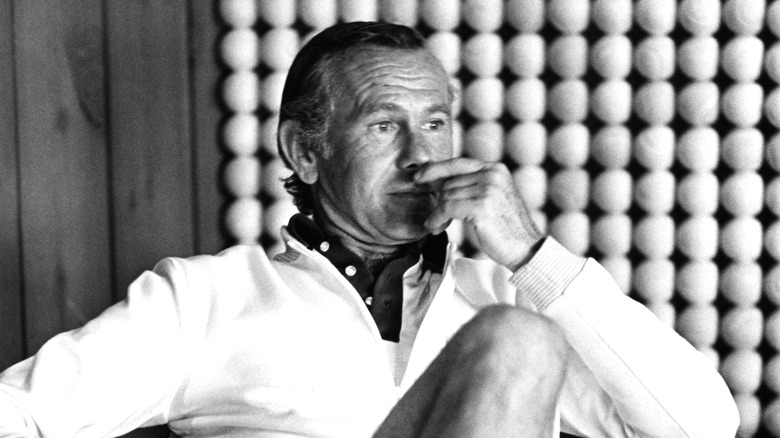Things We Learned About Comedians After They Died
Joan Rivers once said: "I enjoy life when things are happening. I don't care if it's good things or bad things. That means you're alive. Things are happening" (via NBC Washington). It might be a mantra that applies to most comedians, particularly stand-ups, whose profession involves mining their real lives for experiences, both good and bad, that they can turn into material to make people laugh. But while authenticity undoubtedly matters to modern comedy audiences, it only stands to reason that the side of themselves that comedians share on stage is one filtered through a carefully honed stage persona, one that might only be unmasked after their death.
Even when it comes to the greatest stand-ups of all time, many aspects of their private lives only come to light after they have died, when friends, colleagues, and biographers share things with the public that didn't make it into the material or interviews. Here are some of the tragic, shocking, and heartwarming facts we have learned about top comedians after they died.
Joan Rivers died tragically from medical malpractice
Joan Rivers was a trailblazer among the generation of comedians who first hit it big in the 1960s. After years honing her craft in New York coffee houses following a failed acting career, she won a prestigious booking on "The Late Show with Johnny Carson" in 1965, which catapulted her to nationwide fame. She became a favorite among viewers and appeared regularly on the show, filling in for Carson on occasion as a guest host.
Famously, Rivers' life was also beset by a number of professional troubles and personal tragedies. In 1986, Rivers was offered her own late night show — the first to be fronted by a woman full-time — which was sadly a bomb and canceled after just one season. Worse, Carson took Rivers' professional development as a personal betrayal, and their friendship broke down. In 1987, her husband died by suicide, and her career went into free fall.
Rivers overcame her setbacks and remained a popular TV figure and a live draw right up until her death on September 4, 2014, at the age of 81. Rivers died after being admitted for a routine endoscopy procedure at a Manhattan clinic, in which she suddenly stopped breathing. It was later alleged by lawyers for Rivers' family that the clinic had performed a laryngoscopy instead, and the death was later confirmed to be the result of medical malpractice, with the clinic and family reaching an out-of-court settlement.
George Carlin joked about death in his final days
Another comedian who remained prolific until their death was the legendary George Carlin, who died suddenly of heart failure on June 22, 2008. Months before his death, Carlin had released a new stand-up special for HBO, the 14th of his extensive career, which also included 23 comedy albums. Psychology Today's Jay Dixit, who conducted the last ever interview with Carlin, described the comedian as "generous with his time," meaning that the 350-word profile he had originally planned to write soon expanded into a 14,000-word first draft.
Carlin was a hero to many of his fellow comedians, a fearless stand-up whose material pushed the boundaries of the art form and challenged the censorship laws of the day. And as his final interview shows, his colleagues were never shy about giving him praise. Carlin revealed in the interview that he was recently telephoned by a very famous name in the world of comedy, who wanted to praise his new stand-up special and tell Carlin that he was the caller's inspiration to start doing stand-up. After Carlin's death, the caller was confirmed to have been Jerry Seinfeld, who claims that the pair joked about the former's death in what turned out to be their last-ever phone call.
Lenny Bruce's death scene was staged by the police
New-York-born Lenny Bruce was one of the most controversial comedians of the 20th century. Having risen to prominence in the 1950s, like George Carlin he found himself facing down the period's obscenity laws, which led to disastrous consequences for his career and his personal life.
A committed and unwavering social satirist, Bruce spent his career slaying the sacred cows of his era, including the church and anti-drugs policies, and became known as one of the most shocking comedians on the circuit. After growing his audience through a TV appearance on "The Steve Allen Show," Bruce found himself charged with obscenity and blacklisted from many of his former clubs. Facing increasing poverty, Lenny Bruce died tragically after overdosing on morphine in his Hollywood home on August 3, 1966.
At the time of his death, Bruce was considered a dangerous subversive by many of those in power, as well as the tabloid press, although he enjoyed significant support among artists and intellectuals. Thirty-three years after his death, it was revealed that Bruce's body, which had been discovered on the toilet and dressed by the friend who found him, was stripped naked by the police, who decided that the notorious comic deserved to have a sensationalized death photo for the press.
The FBI had a file on Charlie Chaplin
Charlie Chaplin was one of the icons of his day, the silent clown who defined screen comedy for generations of viewers. Chaplin was one of the few to make a successful leap to the "talkies" and then continue to put out seminal work. His great genius was slapstick, a comedic art form he took to heights that defined the genre ever since.
But rather than simply being a physical comedian, Chaplin was also an insightful satirist, whose greatest films were considered subversive by viewers of the day. The 1936 classic "Modern Times," for example, was a searing — and hilarious — takedown of the dehumanizing nature of capitalism, while in 1940, Chaplin turned his attention to fascism with his Hitler-parodying "The Great Dictator." He was also politically active off-camera, with an admitted interest in Bolshevism and friendships with several communist figures.
It later transpired that the beloved comedian had drawn the attention of the FBI, who compiled a file of him hundreds of pages long. The file contained an interview he gave with the immigration office about his political views, among various reports on his personal life. Indeed, J. Edgar Hoover himself was convinced that Chaplin was a communist sympathizer and therefore a security risk, which led to Chaplin being barred from re-entry to the U.S. in 1952. The comedian was also investigated for inter-state prostitution, the result of complaints made against him by an actress, Joan Barry, though charges against him were dropped.
Jim Belushi tried to help Chris Farley
Chris Farley was one of the shining lights of "Saturday Night Live" during his five-year stint on the show, which began in 1990. Known for his physicality and over-energetic performances as characters such as Matt Foley, Farley was instantly recognizable, and became known for making his co-stars break character with laughter at his unpredictability.
The early '90s at "SNL" became infamous for the supposed hedonism of its cast, with the show's legendary after-parties widely believed to be some of the wildest in show business. Much of this was due to the reputation of known party animals, including Farley and former "SNL" star John Belushi. Belushi, who was Farley's great comedy idol, died of a drug overdose in 1982 at the age of 33. And when Farley himself rose to prominence, friends worried that he may suffer the same fate.
One of these was Jim Belushi, brother of John, who has revealed on the David Spade and Dana Carvey podcast "Fly on the Wall" (via People) that he warned Farley: "You can't follow John. You can't follow his track. The guy did drugs. He's dead. You can't follow him with the drugs to find out who he was." Sadly, Farley himself died of an overdose on December 18, 1997, also aged 33.
Garry Shandling's generous side
News of the death of Garry Shandling was met with a wave of shock and grief from the world of comedy. After he suffered a fatal heart attack in 2016 at the age of 66, friends and colleagues poured forward to pay tribute. Shandling was revered as a master of meta-comedy, especially in his spoof chat show "The Larry Sanders Show," which was an influence on comedians including Jerry Seinfeld and Ricky Gervais.
But alongside his comedy, Shandling was also praised for his kindness, as aspect of his personality that came to the fore in the dedications that came after his death. Stars including Amy Schumer, Steve Martin, and Jeffrey Tambor took to social media to share their love for the late comedian. Numerous dedications to Shandling mentioned his immense generosity, which was a central theme in a warm feature about his life and work in the Orange County Register.
Bob Hope should probably have retired
Bob Hope's career as a stand-up, host, and actor began way back in the 1920s, when he moved from vaudeville into Broadway, followed by comedy movies in Hollywood. He came to dominate any medium he encountered, including TV and radio, and became especially famous for his TV specials, which for decades were a regular fixture on the airwaves. Throughout Hope's years of fame, his reputation as a flawless performer and sparkling wit preceded him. And, as he entered old age, he was known for his evergreen youthfulness, appearing around a decade younger when he was in his eighties.
However, time catches up with us all, and sadly Hope's body began to fail him in his later years, and issues grew with his memory, sight, and mobility. Aging is, of course, natural, but the problem for Hope was that he continued to star in TV specials long after he was capable of truly contributing to them, and critics have since stated that he struggled to give up the limelight.
As Robert L. Mills writes for Authors Den, Hope was expected to wind down with a special in 1992, when he was almost 90, but carried on for a few years more, with appearances that were reportedly heartbreaking for his colleagues and fans. He died on July 27, 2003, at the age of 100.
The sweetness at the core of Larry David's friendship with Richard Lewis
Over the course of 12 seasons spanning 24 years, Larry David's "Curb Your Enthusiasm" has established itself as one of the biggest cult comedies of the 21st century. Based on the "Seinfeld" co-creator's real life as a successful celebrity in Los Angeles, the show was characterized by David's incessant bickering with friends, loved ones, and people he encounters in his day-to-day life.
Like David, many of the stars of the show play versions of themselves, including the renowned stand-up Richard Lewis. Onscreen, the two portray a strained friendship, but in real life, David and Lewis were as close as friends could be. The two first met at a sports camp when they were just 12 years old, and later reconnected in the New York comedy scene. They remained best friends until Richard Lewis' death of a heart attack on February 27, 2024, when he was 76.
In honor of his friendship with Lewis, David wrote: "Richard and I were born three days apart in the same hospital and for most of my life he's been like a brother to me ... He had that rare combination of being the funniest person and also the sweetest. But today he made me sob and for that I'll never forgive him" (via Today). David has also since admitted that he still speaks to his departed friend, and feels Lewis is watching over him.
A barrage of one-liners from Don Rickles
Few comedians in the American entertainment industry commanded as much respect throughout their careers as the legendary Don Rickles. A contemporary of Frank Sinatra and the Rat Pack as well as a staple of "The Tonight Show with Johnny Carson," Rickles was a gifted improviser who was best known for his caustic one-liners, withering put-downs, and celebrity roasts.
He died April 6, 2017, at the grand old age of 90, with everyone from Mel Brooks and Dick Van Dyke to Tom Hanks and Danny DeVito paying tribute. And among the dedications came some morsels of comfort for his fans in the form of anecdotes from those who knew him, many of which outlined hilarious encounters with the comedian. Stand-up and chat show host Craig Ferguson posted on X, formerly known as Twitter: "Aw jeez. Rickles. Sweetest, funniest, legend and mensch. Came to a party at my house[,] gave me a dollar and told me to get a nicer place." Meanwhile, Kevin Nealon remembered: "As I was standing nearby, #DonRickles once whispered in my wife's ear, "What are you doing with a loser like him?" I was honored" (via X).
Meanwhile, Rickles' rabbi, Rabbi David Wolpe, penned a piece for Time magazine recalled his first introduction to the comedian, who said to him: "Nice to meet you. In a few years, you will get pimples, but they'll pass," and recounted how on planned visits to Rickles' home the comedian would go through countless variations of telling him to go away before finally buzzing him into the building.
Johnny Carson continued writing for Letterman during his retirement
As host of "The Tonight Show" from 1962 to 1992, Johnny Carson welcomed all of the biggest names in classic comedy, from Groucho Marx to Jack Benny. He was also something of a kingmaker among comedians looking to make it in the entertainment industry. His show provided a coveted spot for a guest comedian to perform five minutes of stand-up on a platform big enough to make or break an up-and-comer's career.
Since Carson's death, lurid details of his private life have occasionally emerged, including one bizarre incident; Allegedly, Carson recruited several colleagues to break into an apartment where his wife had been conducting an illicit affair with an American footballer. That story in particular fired up the gossipy side of the internet, but for Carson's actual fans, a more interesting tidbit from his life came thanks to a celebration of Carson's life, in the form of a monologue on "Late Night with David Letterman."
Following the news of Carson's death, Letterman, who was a former guest host of "The Tonight Show," delivered a monologue comprised entirely of jokes written by Carson for "Late Night," and in doing so revealed that the legend had continued to write and submit material to the show long after the world believed he had retired.
If you or anyone you know needs help with addiction issues, is struggling or in a crisis, contact the relevant resources below:
-
The Substance Abuse and Mental Health Services Administration website or contact SAMHSA's National Helpline at 1-800-662-HELP (4357).
-
Call or text 988 or chat 988lifeline.org
